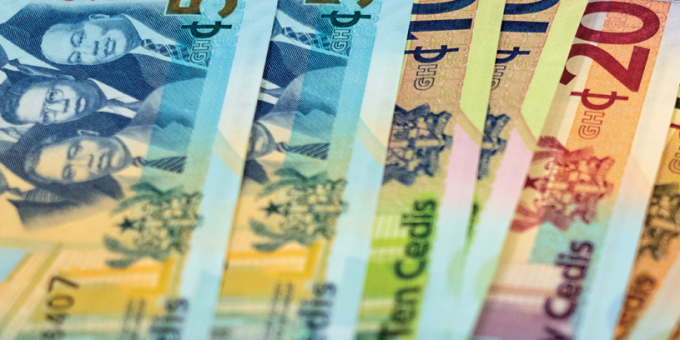The cedi depreciated against all the three major trading currencies on the interbank currency forex market.
The US Dollar appreciated by 1.01 per cent to sell at ¢5.60 on the interbank currency market. The year-to-date depreciation of the cedi thus rose to 1.20 per cent.
The British Pound edged higher, buoyed by receding risk sentiments following news of positive trial results on patients treated with Covid-19 test drug Remdesivir.
The currency traded at ¢7.06 on the interbank currency market as it appreciated by 3.71 per cent. The year-to-date appreciation of the cedi narrowed to 3.65 per cent.
The Euro also held onto its gains against major peers supported by the weaker dollar which blurred the impact of a dovish stance by the European Central Bank.
The Euro thus recorded a week-on-week gain of 2.23 per cent to sell at ¢6.13 on the interbank currency market. The year-to-date appreciation of thus reduced to 1.36 per cent.
Commodities
Brent crude oil rebounded on lower-than-expected inventory build-up in US and optimism on re-opening of global economies.
US inventories rose by nine million barrels for the week ending April 24, lower than the forecasted 10.6 million, allaying some fears of a global glut of oil.
Brent crude oil thus rose by $4.24 to trade at $25.68 per barrel.
Gold closed in the red on account of renewed hopes of a breakthrough on the coronavirus vaccine. The yellow metal lost its safe haven appeal as upbeat news of successful trials for Covid-19 treatment drug Remdesivir sparked risk-taking activities.
Gold thus shed $43.20 to trade at $1,692.40 per ounce.
Cocoa upped its selling price on the international commodities market buoyed by the shortage of quality beans concern and report of reduced favourable climatic conditions in Cote d’Ivoire.
Cocoa thus added $68.59 to trade at $2,409.50 per metric tonne.
Coffee recorded another week-on-week gain follow the reduction in the supply of beans from Brazil and Colombia due to poor climatic conditions. Coffee thus inched up by a cent to close at $1.06 per pound.
Ghana Stock Exchange
The Accra Bourse ended in the red despite the release of some upbeat financial earnings.
Impressive 1st quarter financials by MTN, Société Générale Ghana Ltd, CAL Bank Ltd and GCB Bank Ltd were unable to close the Bourse in the gain as investors react to the dividend suspension imposition be the central bank in a bid to mitigate effect of the Covid-19 pandemic on firms performance.
On the back of this, the GSE Composite Index recorded a weekly loss of 2.41 per cent to settle at 2,100.74 points, representing a year-to-date loss of 6.93 per cent.
The GSE Financial Stocks Index, however, registered a weekly gain of 0.80 per cent to settle at 1,906.41 points, corresponding to 5.61 per cent.
At the close of the week’s activities, market turnout surged with a total of 27.41 million shares valued at ¢19.72 million realised.
This represents over 100 per cent rise in terms of volume compared to the previous week’s outturn of 419,977 shares worth ¢722, 370.00.
MTN Ghana Ltd led the activity chart with 99.13 per cent share of the overall traded volume. Market capitalisation however declined by 0.97 per cent to settle at ¢55,200.79 million.
Stock price movements
In all, a total of eight equities altered their share prices. Ecobank Ghana led the bulls run with price appreciation of 50 pesewas to trade at GH¢7.50 per share.
CAL Bank Ltd a followed suit with price uptick of five pesewas to settle at 82 pesewas per share.
On the flip side, Standard Chartered Bank Ghana Ltd shed 77 pesewas of its opening price to settle at GH¢18.00 per share, it was the worst performing stock in the week’s trade.
Benso Oil Palm Plantation and MTN Ghana Ltd had their share prices declining by pesewas 20 pesewas and five pesewas to trade at GH¢2.65 and 64 pesewas per share respectively.
Total Petroleum Ghana Ltd tumbled by two pesewas trade at GH¢2.78. Other laggards were Access Bank Ghana PLC and Enterprise Group Ltd.
Treasury securities
Yields on Government of Ghana treasury securities, eased further in the week under review.
The yield on the 91-Day T-Bill dropped by 11 basis points to settle at 13.92 per cent. That on the 182-Day T-Bill also went down by two basis points to settle at 14.01 per cent.
The yields on the 364-Day T-Bill and those on treasury notes and bonds were, however, unchanged as they were not scheduled for the week’s auction.
Government accepted all the GH¢623.39 million bids tendered at the week’s auction. This surpassed the week’s target of GH¢603.00 million but significantly fell below the GH¢1.13 billion bids accepted at the previous auction.
The 91-Day T-Bill dominated Government’s purchase, constituting 77.64 per cent with the remaining being the 182-Day T-Bill.
An amount of GH¢991.00 million is projected to be raised at the upcoming auction through the issuance of the 91-Day, 182-Day and 364-Day T-Bills.































